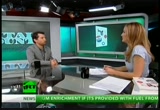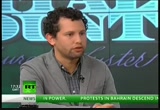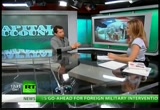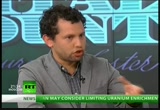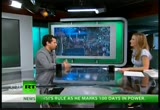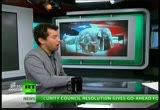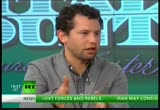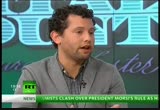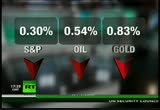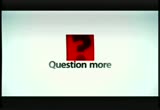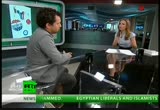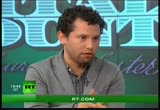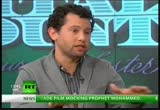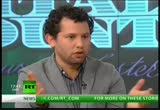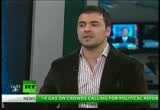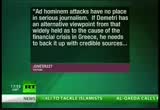tv [untitled] October 13, 2012 1:30pm-2:00pm EDT
1:30 pm
so much for being here on the show great book thanks for having me on but yeah so let's kind of take this from a bigger picture perspective because i don't cover politics i've never covered a campaign i've seen the war room though and i've seen depictions of what campaign headquarters should be like according to my idea of them but is this a little similar to the new york stock exchange floor where trading to the really go on there anymore it's not the full picture well i think that we look at the wrong people if we're looking at the war room or we're following the types of people end up on cable t.v. talking about the campaigns on behalf the candidates every day they serve a whole new rank of geeks who are doing this a data mining what people should generically call micro-targeting which is using individual level data on voters running events at the school models to come up with sort of predictive judgments about how every one of the hundred seventy million potential voters in this country is is likely to behave on election day and the people who are doing that work in campaign and running these basically behavioral science experiments from from within campaigns are thinking about the electorate
1:31 pm
a much more granular way than some of the strategists and it's interesting it sounds like what we talk about with the move towards algorithmic trading where on wall street it's not so much traders as you have these engineers and physicists behind the scenes that are working on these programs that are kind of the rock stars now so let's get into some of these tactics the data mining and the analytics that are being used what are some of the most important or prevalent techniques that they're being deployed in short so the big question in the campaign is how you sort through the electorate which voters do you talk to which voters do not talk to and how do you engage them who are you trying to persuade and who you're trying to mobilize and the big breakthrough after two thousand was a campaigns are able to link the relatively small amount of information on every voter that was in your voter registration record so your name your address your age your gender and your party registration with all the information that the private sector and started to collect in it in private data warehouses to reuse initially developed credit scores credit ratings and became used for the direct mail marketers and charities are now prospecting for donors and soon they would have.
1:32 pm
hundreds if not thousands of variables in every individual in the country and hundreds or thousands of area yeah so that's everything from the stuff that's on your voter registration record to things we know from your census tract about your block or your neighborhood households a likely socio economic status race ethnicity and then things that that these commercial warehouses go out and get which is what you put on a warranty form or if you fill out a sweepstakes to win something and you check off your household income is between seventy five one hundred thousand dollars and you have a high school education of the two people in your household and with a thousand variables an algorithm weights the relative influence of each of those variables on predicting an outcome and the ones that campaigns are most interested in is the likelihood that you will cast a ballot the likelihood that you say that you will in this case support barack obama or support mitt romney or the likelihood that you'll say you're pro-choice or pro-life or whatever the sort of sensitive issue is and so the campaigns develop these individual level scores for every voter in the country and then every voter every three so the obama campaign will give you a score will give you series of scores and one will be a turnout score that's
1:33 pm
a percentage likelihood that you will vote there will be an obama supports or a percentage likelihood that you will vote for barack obama and then they'll be maybe a gun owner score if they're they want to sort of sort out the gun owners in a particular state and the same way that a loan officer at a financial institution won't sign off on the line of credit for you until they've seen a quantitative assessment of your likelihood of defaulting or paying off your bill on time or running up a certain thousand dollars in charges these are credit scores for politics or campaign wants to assess before they send you a knock on your door or call you your likelihood of a performance or an action or or holding a certain attitude and when we talk about the credit ratings agencies not for individuals maybe but for major banks countries even credit ratings agencies have been very wrong dimes so how accurate are these scores for individual voters based on these algorithmic models still sort of a game of margins and so the secret ballot so obviously again they don't know how somebody voted and so there are all sorts of stuff. it's in the process where the
1:34 pm
data can be flawed by how people self report to pollsters or how good groups are predicting it what it does allow him to do is be much smarter about this kind of process of sorting through the electorate so if you have a sixty obama supports core that means the campaign is common and they drew one hundred people who have sixty obama supports goes out they would get sixty votes and so because campaigns are still they have individual contact they are still thinking in the aggregate they're they're pricing in a certain. you know a certain vagueness to the scores but with the idea that they'll make it up on the margins that's really interesting so how much money is being spent on this because we know there is a ton of money being spent on this campaign i'm wondering how much is spent and has that number risen as we've seen the amount being spent on these campaigns rise over the past previous cycles yeah i mean it's definitely lots of being money spent on data and analytics in the most intelligent campaigns and obama's re-election is certainly that's her from the pac is there any way to quantify now it's sort of built into everything they do you know i mean they're trying to use data analytics
1:35 pm
to be more intelligent about sending mail and what they call direct voter contact or is individually targets up but they're also using data to inform how they buy web ads and how they place television radio ads and using data to inform their understanding which cities obama should go to or michelle should go to on the given day and what they should be doing there and so we can think kevin's think that the investment pays off in the x. that makes them more efficient right so part of it is what something that's relatively unsexy because figure out what's the twenty percent of people that i shouldn't send a direct mail piece to because they're already going to vote for me or they're never going to vote for me or they're very unlikely to vote and so when you're spending eight hundred million dollars or whatever that being on each of these presidential campaigns and finding efficiencies of twenty percent here or twenty percent there are end up paying off in the long run right and let's talk about how we got there because you're talking about a campaign going on now with obama's campaign but one thing that i heard you say is that campaigns typically are very innovative which makes sense because you don't have the economies of scale that you have in a typical business these are shorter lived campaigns. so how did that change yeah i
1:36 pm
mean they're like the worst corporations or possible that doesn't exist for three months or six eighteen months the person who's the c.e.o. chairman of a campaign is a candidate who tends to be one of two types of people that bother done it before and they think they figure it out and just keep on doing the same thing they did last summer they've never done it which case there's no good reason why if you are a county judge or city council member you have any idea how you run for congress and so there are usually totally enthralled the consultants and the consultants often don't have an incentive to do anything new or to sort of invest in research or development as if they can get the can to keep on spec doing what they were doing buying t.v. ads or direct mail there's no reason not to and so one of the a lot of the big innovations of actually taking place not in can do campaigns but in more permanent institutions so you know i write a lot about the use of randomized control trials moving into politics basically pharmaceutical trials used for campaigns and this is coming from the social sciences political scientists an economist and and psychologist innovate and then campaign start to realize that there's something that they can learn from these
1:37 pm
lessons so then so is it that campaigns are kind of playing catch up with the broader use of technology within the broader economy i think that's right yeah i mean so they're learning from academia and you see institutions are a little more permanent the a.f.l.-cio big labor is has been since they spent tens of millions of dollars on campaigns every year and figure out how to be three percent or five percent better next year is of great value to them and in a way that you know mitt romney's not going to put a dollar on to the side for research or set aside a control group in a task for saying that might not yield a lesson until december ok and let's bring up one example that i saw in one of your posts on slate if we could bring up that postcard. a pledge to vote so this is a pledge to vote this is for obama's campaign what is the empirical evidence behind this suggesting it works and does it actually work yeah so lots of these experiments have been done many of them translating things that we've seen in other parts of behavioral psychology to voting and there's been these tests where they get people if you commit gets into. commit often in writing to doing an action or
1:38 pm
more likely to follow through on it and so this is now sort of ubiquitous in the obama campaign these commit to vote pledge to vote cards and we've seen you know it's one of these and one of the most amazing things we've seen from all these experiments is that but you know we often think that campaigns just as contests to change people's opinions and so often campaigns now are focus on mobilizing people who already support the candidate but just aren't habitual voters and they're you want to modify their behavior and often the behavioral interventions that work like these pledge cards are things that don't have to do the candidates they don't have to do with the particular parties or the issues or the stakes but they're designed to make somebody in this case feel like. they're sort of being judged if they don't live up to a commitment that they've made yeah i know i heard you say that social pressure that's pretty effective when it comes to getting people to vote but we'll talk much more about this after the break we're going to toss to one for a couple minutes but then we'll talk about some of the consequences of this transition and the people that maybe can't keep up in your view maybe the press so a lot more sasha eisenberg author and journalist and still ahead i tried my hand at
1:39 pm
stand up comedy i told you about it but we'll show you some added and you can be the judge of how i did at the end of the show but first your closing market numbers . even in the years. it's never too late to start over. trying to treat her like. when a bar in the championship. or become a part. in the. north.
1:40 pm
1:41 pm
1:42 pm
1:43 pm
to then figure out who candidates are going to reach and how they're going to target them and sasha eisenberg has written a book on this he is author of victory lap and briar first late magazine so before the break one thing that i wanted to ask that i didn't get to so you talked about this evolution towards this kind of algorithmic model however does that mean that focus groups and polls and kind of the traditional things that maybe we're looking at as a consumer of media or a watcher of politics are irrelevant or they just a smaller or a different part of the pie or different part of the pie and so have different challenges internally they need to do a lot of qualitative research to figure out what types of language they ally how they should be engaging on issues and still focus groups are useful because you get a sense of what bits of language are imagery voters actually respond to and then and then the creative types on the campaign can work with that but they're also clearly artificial environments and so you can imagine the fine you get twelve
1:44 pm
people sit around the table eating sandwiches and you show them an ad and then you go around and say what do you think that that's not how we watch ads nobody prompts you immediately afterwards to have an opinion on an ad and so they're really limited to something we have here and we still know very little about how voters change their minds or how campaigns can influence them and persuade them what we do know a lot about is how you can be a lots more about individually targeting voters and how you can meaningfully engage them to change their behavior to sign to register deciding to vote and so that's where so much of the innovation is taking place so it's aware that innovation is taking place is it more about mobilizing the base to vote or is it more about targeting that three to five percent of people that are really truly undecided or persuadable i mean most campaigns are doing both but there's so much more emphasis now on mobilization so almost everything i write about the book has taken place since two thousand and the thing we became really apparent after two thousand two things one is we learned how polarized the country had become. in partisan and ideological terms it became clear that this idea that was sort of present through
1:45 pm
the ninety's that campaigns would be won by winning over swing voters in the middle no longer necessarily ring true in the campaigns have to spend as much time being really precise about pinpointing people who like their candidate identify with their party or generally part of their coalition but it's not regular voters there's just not something that they regularly do. and we also learned after florida what a small margin in a campaign could be worth and so campaigns are now making you know almost everything right about the book is fair to be two point two or three points or four points better but it can start to realize that in really tight hard and races like this presidential campaign that small difference will make you know that could determine the outcome and so there's there's so much more attention being paid now to being smart about getting your people to do something they're not used to doing in this case voting then there is that message just trying to change people's minds and is it because you mentioned obama and kind of his tactics that something i've heard you talk about before is this being used by every candidate in every campaign is romney doing this to you is this the norm now or is there one example of the
1:46 pm
best or are the people that really pioneering this i think obama's definitely the cutting edge of romney's pretty advance on using data and for micro targets campaign two thousand and two for governor was really the first campaign by a candidate to use sort of modern data and microtargeting the obama campaign or innovators on the use of these randomized experiments to measure the actual empirical an empirical terms the effect of what they're doing but we're trying to use democratized and so now obviously your local state legislative campaign or everyone have access to the same data and sophistication that the obama campaign has but. these scores are becoming the currency for everybody who's trying to make a determination about which types of voters they should be talking to and when they talk to voters in your experience is this more about servicing truly the electorate or is it more about figuring out ok this is what's important to this person so i can just tell him what they want to hear on. that and they'll be good to go well i mean i think those might be the same thing i mean i think campaigns are rich in knowing more about you because they want to connect with you in
1:47 pm
a meaningful way and connecting really. mean that they want to talk about an issue that you care about they have no interest in talking to you about something you don't care about and at the same time they want to meaningfully engage you psychologically and if it turns out that you're more likely to vote by getting a social commitment from you like signing one of these pledge cards or using some form of social pressure to make you feel like you ought to be voting to fit in with your peers they'd rather do that then talk to you in sort of abstract terms about your civic duty or what would be good for your party or something like that and before we go i know you've been critical saying that journalists don't really have the expertise to report on this that similar to what we're talking about how regulators don't have the expertise to keep up with high frequency trading or changes in complexity at banks so why is this important to report on first of all and second of all why do you think reporters really have what it takes to know what's going on i think we're seeing this in almost every sector where there is a level of sophistication there's proprietary data they're just tools that we don't on the outside have and i think that folks covering wall street were both slow to catch up with the methods that people are using in terms of trading and we just
1:48 pm
don't see the research that are banks trading desks have you know people cover the pentagon don't know as much about how they're making decisions about going to war as they might have fifty or one hundred years ago and so i think the big part of the problem for people who do what i do in cover campaigns is people talk with far more certitude in confidence they do know what's going on or that these things are explainable in the smartest people i talk to in campaigns have access to the most data in the most advanced empirical methods are the ones who are the the most ready to say i have no idea how any of this works there's so much fog and so ability so little ability to sort of say you know sort of the clear laws of physics about about how lections work and quickly before we go why does it matter why is this important and sometimes i think that the horse race politics of kind of like white noise well i think that how people get elected matters because it's terms how they govern so that the type of coalition that mitt romney or barack obama uses to get to fifty one percent next month will determine the promise. he's made the people he owes things to what what will be expected to do in the town of washington good
1:49 pm
point all right well thank you so much very interesting book victory lab very relevant saussure eisenberg he's the author is also a writer for slate. all right let's wrap up with loose change dimitri more today than know we've been nobel committee has decided that this year's nobel peace prize goes to the european union . the european union and he's going to go to great economic difficulties and close to three of these soldiers on. the regional grow to full all these years most important. this suggests rules for
1:50 pm
i'm grateful for years for democracy on your been going. ok this is just bizarre because it feels a little like social engineering is that the nobel committee really wants to hold it together when you look at what the nobel committee was saying dimitri it's all about hold. it vance mint of peace and reconciliation to applaud it solidarity as it continues to work to contain the debt crisis hanging over the eurozone it's like a kind of trying to push them to to make this work i think it's actually like giving the political cover i think that's the kind of doing i think the noble peace that will committee always comes in just a kind of smooth things over they gave kissinger the nobel peace prize i think after we pulled out of vietnam. and seventy five whatever that would actually make more sense now ruins the general ewing it hoping that it will achieve
1:51 pm
a certain result like what they did with obama to obama he's probably were hoping he wouldn't go to war maybe as a result and then he continued to plunge the us into wars i feel like this is a similar indication of. so maybe yeah so they're working i think it goes back to the same thing it's like there's a political cover it's there's no there's have to be any objective. assessment about that even though what this thing about peace is the like i don't know what the what the what's the thing about peace prize dimitri i don't know they say good job keeping peace during this time when you come together as the e.u. you know there hasn't been a world war two since you're formed but it's a it's a europe it's a monetary union and a trade union and a political union and the last time they had a new war was forty five so i don't really get well and there are social unrest in all of these countries that are subject to austerity and also the e.u. was involved with the us in war with libya it's not exactly like it's being entirely peaceful and also one thing i want to point out there working with mr
1:52 pm
barroso and vandar on boy to go to the nobel prize ceremony later this year i all i can say is i can't wait to see this parliament. does not go that happened he was sent on a memo he sent a memo about this book real quick these guys love ceremonies by the way all these like bureaucrats and central planners they just love all these ceremonial things all right so anyway i think that in the view of the servant of the screen of everything else let's move on briefly because when jamie dimon spoke at c.f.r. earlier this week in d.c. here's how he summed up problems in the financial crisis. in france of course with more complex than the one thing we have to more leverage in the system the more polluted. ok so the mortgage market was polluted in part by his bank however things are turning around when it comes to mortgages for the bank j.p. morgan reported earnings today and the mortgage business continues to boom at the bank but why this is thanks in part to the government programs to help underwater
1:53 pm
borrowers refinance however what analysts are finding is that this program is helping banks make more money then it is saving homeowners money which i just thought there was always in the fine print when you're reading about any kind of banks earnings some kind of subtext of this if there's a government program involved that supposed to help main street it wall street is somehow reaping the better benefit that won't because the longer they're to actually if it ever was but it certainly is there now to help the largest most powerful institutions the thing about polluted is really funny because they've effectively polluted the estuaries all right and now that they're polluted they have ability to extract whatever is nonpolluting or to to to refine the water for themselves but that has that actually has no bearing whatsoever on whether the river itself is to talk about the mortgage market but in fact we've been saying is the mortgage market for the banks is far or it's turning but actually if you're a homeowner returning a loan you're in deep doodoo boy are you saying there are more foreclosures to come there's more and more of that kind of damage to come but that it's turned
1:54 pm
a corner for him for him. let's move on because some like steve chappell on our facebook page have said that they want to see my comedy routine dimitri i was there i love that you were there right after. we finally got some footage let's take a look at a little clip. one of our producers who didn't come because. she was. like you. ever. even though i don't even live here i live in d.c. but i know this because i was here for eight months. which didn't obviously work out looks. very serious like. thank you very much go home to your baby. so i made people want to have the holiday and i know i wanted that and there are
1:55 pm
a lot that i know that it was hilarious for coming and it was really funny you were the funniest one the guy who i think who won it was the only guy i didn't see and that's when i walked out so maybe he was you know they are all right all right all right i think of all the ones i saw i was up about all right well thank you for valjean for me now i've done my part let's bring up a viewer comment because we usually give your feedback tonight we have a chance for dimitri to respond to something targeted again this person jones are two to seven said ad homonym attacks have no place in serious journalism it dimitri has an alternative viewpoint from now widely held as to the cause of the financial crisis in greece he needs to back it up with credible sources being greek is not sufficient capital count can do itself a favor and not lend a platform for dimitri's diatribes or let's have a while back start where dimitri can educate us on his facts. i'm going to give you a letter to resign or to respond to this guy give him a bunch of facts and figures and everything else how do it like the lazy greek thing shocked how many people were shocked that mean for insinuating that things
1:56 pm
are a little bit more complex in greece and i was just a bunch of greeks driven drinking for opportunities both by the side of the water on their kayaks i don't mean so. i mean i'll say one thing to our audience if you ever do anything on our facebook page especially not so much on you tube anymore but on our facebook page i will give you any of the documentation of your acquired fact during the show as we provide off them. upload a lot of doctors that we use to produce the show all right so go talk to dimitri on facebook as we have to leave it there for today that is all we have time for thanks for watching be sure to come back next week and in the meantime you can follow me on twitter at lauren lyster go like our facebook page or chat with dimitry there you can give us feedback on this show any you missed it you tube dot com slash capital account you can watch as an h d on hulu the address is right there and from everyone here have a great weekend. i'm
1:57 pm
in sochi the u.s. city and europe on the host of the twenty fourth season which are the pregame. thank you. so much. thank you. don these. days it. can. be. so. download the official application so choose your language stream quality and enjoy your favorite. t.v. is not required to watch on t.v. all you need is your mobile device to watch our t.v.
1:58 pm
1:59 pm
44 Views
Uploaded by TV Archive on

 Live Music Archive
Live Music Archive Librivox Free Audio
Librivox Free Audio Metropolitan Museum
Metropolitan Museum Cleveland Museum of Art
Cleveland Museum of Art Internet Arcade
Internet Arcade Console Living Room
Console Living Room Books to Borrow
Books to Borrow Open Library
Open Library TV News
TV News Understanding 9/11
Understanding 9/11
